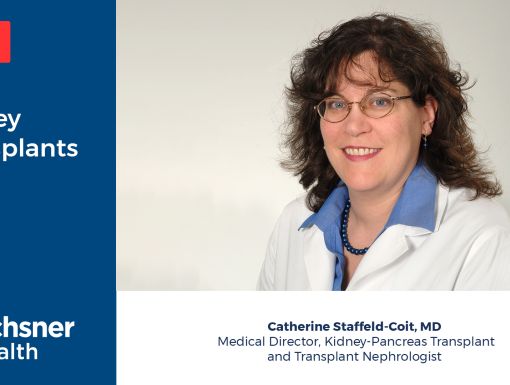
Living Kidney Donations: Who Can Donate and What is the Donation Process?
Choosing to donate a kidney and give the gift of life is one of the most meaningful and generous things anyone can do. However, there are many things to consider when making this decision.
What are the benefits of a living kidney donation?
For a living kidney donor, the ability to improve the health and quality of life of another person is a rewarding experience. The extensive testing a donor completes also allows them to learn about their health and make improvements that may impact their future.
Recipients of living donor kidneys benefit by avoiding a five- to six-year wait to get a deceased donor's kidney. This also prevents potential health problems when a person is on dialysis for a long time. Transplants from living donors are scheduled conveniently for the donor and recipient, avoiding the stress and uncertainty of being on the waiting list. Lastly, kidneys from living donors usually work immediately after transplant and last longer than deceased donors.
Who can be a living kidney donor?
Any person over the age of 18 who is in good overall health, able to understand the risks and benefits of donation, and is willing, can be considered for kidney donation. They must also have good kidney function and anatomy as determined during the testing process.
How to become a living kidney donor?
Becoming a kidney donor begins with an initial screening by the Ochsner Transplant Institute. The first step is to complete an online health history questionnaire. The Ochsner team will obtain information, including medical and surgical history, medications and social history. Certain medical conditions may prevent living donation, such as diabetes, obesity, cancer and heart disease.
Once the health questionnaire is complete, it will be reviewed by an Ochsner living donor coordinator. Possible candidates for donation are contacted by phone to review the process and make arrangements to speak with an independent living donor advocate. This ensures they understand all aspects of the donation process, including the risks, benefits and rights. Agreeing to become a donor is completely voluntary.
The next step is to see if the donor is a match for their recipient. This will involve a blood test to check the donor's blood type and see how the recipient will react to the donor's kidney. If the donor and recipient are not a match, an exchange program with other living donors and recipients may be an option.
If the donor and recipient are a match, the donor will need to complete a medical evaluation. This involves one to two days of testing to ensure the donor will not be harmed, that they are healthy and will remain healthy after donation. We want to be sure the donor understands all aspects of the donation process and has their questions answered. During the evaluation, the donor will meet with all members of the transplant team. They will have tests to check their kidneys, heart, lungs and overall health. Once the test results are available, the team will review the information and decide if they can donate.
Kidney donor surgery
Once approved for surgery, the donor will choose the day they wish to have surgery. Pre-operative appointments will be scheduled one to two weeks before the surgery date. During these appointments, the donor will meet with members of the transplant team for a final checkup. Consent forms allowing the surgery to take place will be signed and instructions for surgery will be reviewed.
The donor will be admitted to the hospital the morning of surgery. The kidney is removed laparoscopically. This is a minimally invasive procedure that can make the surgery easier for the donor. The surgeon will make three small incisions around the abdomen. A special camera is placed in one of the incisions that transmits a real-life picture of the internal organs to a video monitor that the surgeons use to complete the procedure. The kidney is removed through a 3-inch incision below the belly button.
Recovering from kidney donation
Donors stay in the hospital overnight after surgery. The day after surgery, if they are walking, eating and drinking without difficulty, they can return home. If the donor lives more than a few hours away, they may be asked to stay locally for a few days of their recovery.
Recovery after kidney donation can take four to six weeks. The donor will experience pain and discomfort after the surgery for which medication will be prescribed. We ask that the donor have a support person with them after surgery to help them. While the incisions are healing, donors cannot drive for about two weeks or do any physically demanding activity for four to six weeks. They will not be able to return to work for two to six weeks, depending on their job.
Life with one kidney
Once the donor has recovered from the surgery, they can go back to their normal daily activities. Based on the available information, the overall long-term risks of having problems after donation are low. However, a person's risk for future health problems can differ depending on personal medical and family history. It is recommended that donors have yearly visits with a primary care physician for routine physical and blood testing.
Deciding to become a living kidney donor is an extensive process. Knowing the facts will help the donor and their family make an educated decision that they feel comfortable with. It is also rewarding to know someone has been given an opportunity for a longer and better quality of life.



